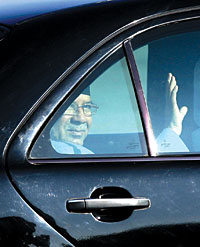 KIRAN PANDAY |
Nepalis love junkets and consultations and every new word creates new opportunities. Hundreds made it to Rio in 1992, other hundreds made to Jo'burg in 2002 and hundreds more have made it to Copenhagen. Crowding the bars in Copenhagen and discussing politics till the wee hours, however, is not going to get us solutions. We don't even know how many Nepalis are actually presenting papers, how many people are writing for international audiences, and how many are willing to practice what they preach.
Buzzwords such as sustainable development, climate change and carbon footprint need to be understood in the context they are being used in. In the recently released Superfreakonomics, the authors cite examples of how, back in the day, New York's horse carriages were considered an environmental menace because of the dung, disease and noise they produced. When fuel-fired automobiles were introduced, they were considered saviours. Today, this role has been usurped by electric and natural gas-fired vehicles.
So when we use these words in a Nepali context, we need to look at how we understand and internalise them. For instance, the green stickers we use to certify that our vehicles meet pollution standards are basically an over-the-counter purchase of a certification, like many government approvals. But as the idea was conceived and pushed by donors, we take it as something imported and have not internalised the rationale. How to make our drivers understand that they are responsible for ensuring that their vehicles pollute less is perhaps more important than filling seminar halls at five-star hotels.
Similarly, how do we ensure that the parents who look on idly as their kids litter the streets with empty noodle packets teach them that this is wrong? Look at the civic conduct of those who give lectures on environment and sustainability. How many of them know what is happening to the trash that is being generated at home, how many of them toss cigarette butts everywhere after a few drinks, and how many of them are aware of the carbon footprint of all their junkets?
Nepal's economic growth trajectory has been punctured by those who adopt words but don't internalise their meaning. Like the slogans that we used to chant for the kings not knowing why, we keep on adopting newer slogans to chant. The fact that we have not been able to internalise the words 'conflict resolution' means we have a society traumatised by violence. The fact that we have not been able to internalise the words 'labour rights' means both employees and employers are busy destroying enterprises. The fact that we have not been able to internalise 'inclusion' means we are limited to ticking boxes whenever we want participants from supposedly excluded classes. Hopefully, we will learn from our past mistakes and explore ways to actually internalise sustainable development and climate change issues, or we will simply abandon these concepts once new slogans and new junkets make themselves available.



